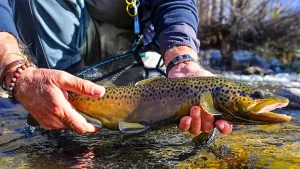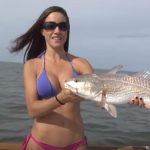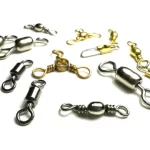Fly fishing can be an incredibly rewarding experience, but it’s easy to make mistakes that can lead to frustration and lost opportunities. Whether you’re just starting or have been fishing for years, there are common errors that can impact your success on the water. By knowing what to avoid, you can enhance your fishing skills and increase your chances of landing that big catch.
1. Overdoing False Casting
One of the most common mistakes made by anglers is casting too frequently. While it’s natural to want to make the perfect cast, too many false casts can actually scare the fish away. Fish are highly sensitive to vibrations and movements in the water, and repeated false casts can spook them.
To avoid this, focus on executing smooth, deliberate casts. Properly loading the rod during the backcast allows you to increase line speed when shooting it forward, reducing the need for multiple false casts. Minimizing false casts also prevents tangles and wind knots that can complicate your fishing.
2. Using the Wrong Knots
Mastering knots is an essential part of fly fishing, and using the wrong knot or an improperly tied knot can result in losing the fish of a lifetime. A poorly tied knot can easily break under the pressure of a big fish, and that feeling of losing a catch due to a knot failure is frustrating.
Make sure you’re familiar with key knots like the clinch knot, surgeon’s knot, and nail knot. Practice tying them before you hit the water to ensure they hold up when it matters most. Also, always double-check your knots before casting out to avoid any surprises.
3. Rushing the Process
Patience is crucial when fly fishing. Many anglers make the mistake of rushing into action, whether it’s casting too quickly or moving too fast while wading through the water. Patience pays off when fly fishing, as fish activity can be subtle and slow, requiring a keen eye and calm movements.
Before casting, spend time observing the water and the fish. Watch for rises, ripples, or fish huddling near the bank. This will give you an idea of where to cast and increase your chances of success. Don’t rush the process—take your time to watch, plan, and then act.
4. Not Matching the Fly to the Fish’s Diet
Understanding what fish are eating is key to selecting the right fly. Different species have different feeding habits depending on the season, water conditions, and the insects available to them. For example, trout are known to feed on mayflies, caddisflies, stoneflies, and midges, so using flies that imitate these insects will increase your chances of attracting them.
Check out local resources or talk to experienced anglers in your area to learn more about the most effective flies for your target species. Avoid using oversized flies that may not match what the fish are feeding on. Smaller flies tend to work better, attracting a wider variety of fish.

5. Weak Casting and Hooking
Fly fishing involves precise movements and timing, and a weak cast or poor hooking technique can lead to missed opportunities. If your backcast lacks power, it can result in tangles and sloppy presentation of your fly. A strong, controlled cast allows your fly to land in the right spot without unnecessary slack or wind knots.
When setting the hook, avoid jerking the rod straight up. Instead, pull back slightly and to the side to ensure the fish takes a solid bite. This subtle motion gives you more control and increases the chances of successfully hooking the fish.
6. Incorrect Line Handling
One of the most common mistakes in fly fishing is improper line management. Too much line out can lead to tangles, knots, and frustration. Conversely, too little line can prevent the fly from reaching the fish. Proper line technique is essential for effective casting and presentation.
Make sure to mend your line as it drifts through the water. This ensures the fly moves naturally and doesn’t drag unnaturally. Learning how to mend your line properly can make a big difference in how your fly behaves in the water and increase your chances of a successful hook.
7. Disrespecting Fellow Anglers
Fly fishing is often done in public or popular spots, which means you’ll likely encounter other anglers. One of the worst mistakes an angler can make is being inconsiderate of others. Avoid crowding someone else’s fishing spot or casting too close to another angler. Not only is this disrespectful, but it can also affect your chances of success by interfering with their fishing.
Always be mindful of your surroundings and treat other anglers the way you’d like to be treated. Give others space, and be patient if someone is already fishing a particular spot.
8. Final Thoughts: Improving Your Fly Fishing Skills
Fly fishing is an art that requires practice, patience, and attention to detail. By avoiding these common mistakes, you can improve your technique and increase your chances of success. Whether it’s mastering the perfect cast, using the right fly, or being mindful of your surroundings, every detail counts when you’re out on the water.
Take the time to practice your skills, learn from your mistakes, and enjoy the experience of fly fishing. With a little effort and some helpful tips, you’ll be reeling in more fish and having a great time on the water.
Image/Source: Wired2Fish





